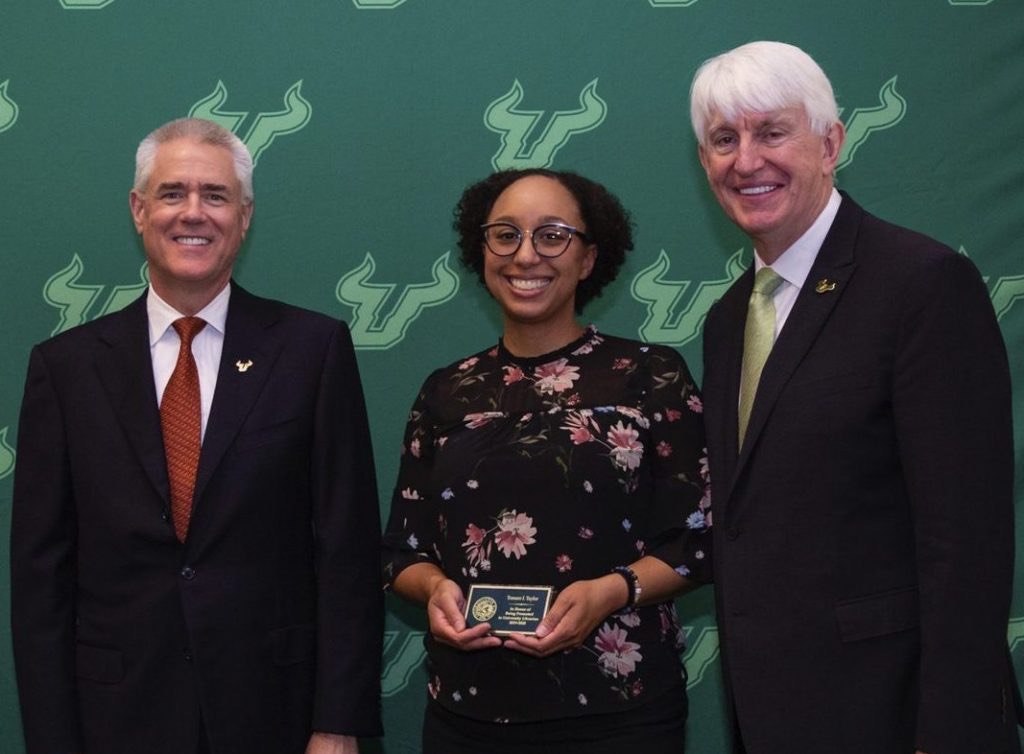Changing the community: Special collections director brings forgotten history to students

Finding a lost piece of Florida history is just another day on the job for Director of Special Collections Tomaro Taylor.
“Our Collection Coordinator Sidney Jordan identified three historic Black newspapers that were either Tampa or Florida based,” she said.
“They were the Black Journal, the newspaper for Black Professionals, the Florida Courier, which was Florida’s only statewide circulated Black weekly, and the Progressive Village Pioneer, which we already had a collection of papers from. They had no other holdings at any other library, which makes them extremely rare.”
As a USF alum, Taylor earned her bachelor’s and master’s in both psychology and American studies. While uncertain about going into the psychology field, she took a class with the late professor Priscilla Brewer. It was in that classroom she found the love that would define her career path.
“I had just gone into the American Studies undergraduate program because when I graduated with my degree in Psychology, I wasn’t sure I wanted to work in that field,” she said.
“I took a couple classes with Dr. Brewer and I just fell in love with our culture and American society. I loved the materiality. The historical record, and whatever format it presents itself in, is just something that really demonstrates the wealth of our culture. I learned so much from her.”
Though she originally took interest in museum studies, Taylor chose to stay at USF to get her master’s in library and information science. While she intended to use her degree to enter the museum education field, she chose to stay within the library field and began as a graduate assistant at the Tampa Library’s reference department. Taylor later took a residency position after completing her degree.
“There was nothing I was interested in outside of the museum, but when I got to the program, I learned everything there was to know about libraries,” Taylor said.
“Working in a library, special collections was the closest thing to having a potential career in a museum. My degree didn’t align with my original professional ideas, so I thought, ‘How can I merge these things together?’ Special Collections was the opportunity for me to do that.”
The Special Collections at USF Library contain materials of importance to various subjects, most to material culture and history. Materials can be all mediums, such as a newspaper, movie, or piece of furniture. The collections are used mainly for research and teaching materials, but all students are able to access the collections online.
Taylor joined the USF Special Collections department as a permanent faculty member in 2004 and has focused on archives ever since. Most of her work occurs behind the scenes, creating grassroots connections with donors and authenticating materials. What she said the department is truly looking for, however, is whether the materials will benefit the education of USF students.
“We have people who reach out to us and have materials that fit our specific collecting areas. Then we have to do an evaluation of the material, and what we’re looking for is the inherent value,” Taylor said.
“You have to ask, ‘How can it be used by people?’ We want to know if people can use this material for research purposes, what it can support in terms of their education and understanding of the world around them.”
Because of the history of these materials, many are in very fragile condition. This is especially true for the Florida area, as weather conditions can cause further detriment, according to Taylor. That element is taken into consideration when discussing how materials can be used. She said the introduction of digitizing has revolutionized the way that materials can be accessed by the public.
“There is the element of asking if something can be physically used or if it would require some sort of treatment,” Taylor said. “Sometimes you can give the materials to an expert to do repair work. But when looking at digitizing, a large part of that is building out digital collections online and making them available for public use through the [library’s] Digital Commons.”
The Digital Common’s are available online for all USF students to access. These collections range from African American to LGBTQ and Florida’s natural history. For Taylor, being able to give space to the stories of those in American history who may not have been given a chance to be seen is something she finds to be more necessary than ever.
“It’s very important that the resources that we make available through libraries and special collections and archives, speak to the needs of the people who come to use them,” she said.
“We get a very wide range of people who are interested in learning about different topics and see different things in those resources. Whether it be the newspapers or correspondences or AV, regardless of if the formal is a physical or digital manifestation.”







